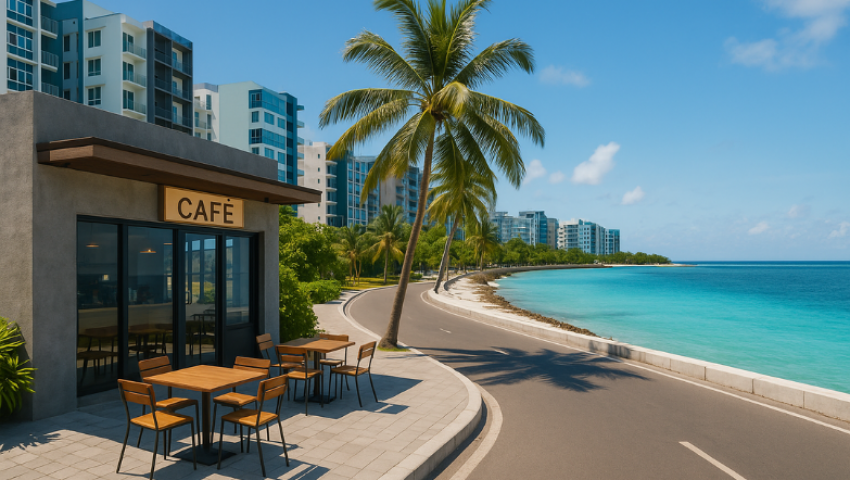
Ultimate Guide to Starting a Café in Hulhumale, Maldives: Step-by-Step for Success
Learn how to open a thriving coffee shop in Hulhumale, Maldives, with updated 2025 regulations, market insights, legal tips, and sustainability strategies to attract tourists and locals.
Starting a café or coffee shop in Hulhumale, Maldives, presents an exhilarating opportunity in a rapidly evolving island city. As a reclaimed landmass adjacent to the capital Male, Hulhumale is booming with residential developments, expatriate communities, and tourism influx, making it a prime spot for food and beverage ventures. With its pristine beaches, modern infrastructure, and growing population, the area has seen a surge in demand for cozy cafés that blend local charm with international coffee culture. However, success requires meticulous planning amid unique challenges like import logistics, regulatory hurdles, and environmental considerations. This comprehensive guide, updated for 2025, walks you through every step, from market research to launch, incorporating the latest legal updates, practical examples, and strategies to build a resilient business. Whether you're a local entrepreneur or foreign investor, this roadmap will help you navigate the process effectively.
1. Market Research and Feasibility Study
Before investing, thorough market research is crucial to gauge demand, preferences, and competition in Hulhumale's dynamic landscape. The island's population exceeds 50,000, including a mix of Maldivians, expatriates from South Asia and Europe, and tourists drawn to affordable alternatives to resort islands. With ongoing developments like Hulhumale Phase 2 and 3, foot traffic is increasing around beaches, parks, and new housing complexes.
- Target Audience: Focus on demographics, young professionals and families seeking quick grabs, tourists craving Instagrammable spots, and expats desiring familiar brews. Surveys via social media or local forums can reveal preferences for specialty coffees, halal snacks, or vegan options influenced by Islamic culture and health trends.
- Competitive Analysis: Scout established players like Meraki Coffee Roasters, known for its artisanal beans and cozy vibe, or Family Room Coffee, which excels in family-friendly atmospheres with ocean views. Identify gaps, such as limited late-night options or eco-focused cafés. Visit competitors to note strengths (e.g., Civil Coffee Roasters' local sourcing) and weaknesses (e.g., high prices alienating residents).
- Feasibility Factors: Assess economic indicators, like tourism recovery post-COVID, with over 1.5 million visitors annually to Maldives. Factor in seasonal dips during monsoons (May-October) and peaks in dry seasons.
2. Business Plan
A robust business plan acts as your blueprint, essential for securing loans or investors. Tailor it to Hulhumale's context, emphasizing scalability amid urban growth.
- Executive Summary: Outline your concept, e.g., a beachside specialty café targeting eco-conscious tourists.
- Business Model: Decide on formats like grab-and-go for busy locals or full-service with live music, inspired by successes like Seagull Café's hybrid approach.
- Market Analysis: Integrate research findings, projecting demand based on Hulhumale's 10% annual population growth.
- Menu: Curate offerings with local twists. coconut lattes, tuna pastries, or halal-certified desserts. to respect cultural norms and reduce import costs. Include trends like plant-based milks for health-focused patrons.
- Operations Plan: Detail suppliers, inventory via tech tools like POS systems, and daily workflows. Integrate digital ordering apps to streamline service.
- Financial Plan: Project costs (startup ~MVR 500,000-2,000,000) and revenues, accounting for 2025 tax hikes.
- Marketing Plan: Leverage social media and partnerships, as detailed later.
3. Legal Requirements and Licensing
Navigating Maldives' regulations is vital; non-compliance can lead to fines or closures. Use online portals for efficiency.
Registering Your Business
- Register via the Ministry of Economic Development (MED) Business Portal (business.egov.mv).
- Choose structures: sole proprietorship for locals, LLC for foreigners. New 2025 rules mandate at least one Maldivian director for LLCs, with exceptions for approved investments. Foreigners must secure an investment permit if capital exceeds thresholds, submitting detailed plans. Pay a USD 5,000 administrative fee to MIRA for foreign entities.
- Name registration and tax setup follow. Register with Maldives Inland Revenue Authority (MIRA) for taxes; the Tourism Goods and Services Tax (TGST) for tourism-related services is now 17% effective July 1, 2025, while general GST remains 8%. 3 or more Cafés serving tourists typically fall under TGST.
Café Licensing
- Obtain a Trade Permit from Hulhumale Development Corporation (HDC) or Male City Council.
- For food safety, apply to the Maldives Food and Drug Authority (MFDA) under the Ministry of Health. Comply with the Food Safety Act (Law No: 6/2024), requiring hygiene standards and staff training.
- New Food Advertising Regulations 2025 (Regulation No: 2025/R-25) mandate MFDA approval for all ads, including social media posts. Use the oneGov portal for online registrations.
- Environmental Impact Assessment (EIA): Required only for larger setups in sensitive areas, as assessed case-by-case by the Environment Protection Agency (EPA), not standard for small cafés.
- Work Permits and Visas: Hire via the Ministry of Immigration; foreign staff need work permits. Prioritize locals to foster community ties.
4. Find a Location
Location drives success in Hulhumale. Prioritize high-visibility spots with foot traffic, like near beaches, the Central Park, or Phase 2 developments. Proximity to hotels and residences attracts mixed crowds. Check leasing rates (MVR 20,000-50,000/month) via HDC portals. Fore examples, Red Snapper & Coffee Beans thrives in central spots for accessibility.
5. Design and Layout
Create an inviting space blending Maldivian elements with modern aesthetics. Use light, tropical palettes and open layouts for a beachy feel. Offer outdoor seating with sea views, as at Ocean Kitchen. Invest in durable equipment like espresso machines, considering humidity-resistant models.
6. Sourcing Products and Ingredients
Quality sourcing differentiates your café. Import coffee beans from Ethiopia or Colombia via Maldives Customs Service permits; duties can reach 10-20%, so partner with local importers to cut costs and delays in island logistics. Use local produce like coconuts or fish for authenticity, as in Gloria Jean's localized menus. Build supplier networks for dairy and pastries.
7. Hiring Staff
Recruit baristas and cooks familiar with local tastes. Train on specialty techniques and cultural sensitivity, e.g., Ramadan adjustments. Aim for 5-10 staff initially; use platforms like Jobs.mv.
8. Marketing and Promotion
Combine digital and local tactics.
- Use Instagram/TikTok for visuals, as Kamari Cafe does with live music posts.
- Partner with hotels for tourist discounts.
- Host events like coffee tastings or beach clean-ups.
- Implement loyalty programs.
- Integrate tech: POS for orders, apps like local delivery services for reach.
9. Sustainability and Eco-Friendly Practices
Emphasize green initiatives in eco-sensitive Maldives. Use biodegradable packaging, energy-efficient appliances, and reusable cups. Engage in community events, boosting reputation like Nami at Riveli's beachside sustainability focus. Example lonumedhu.com
10. Cost Management
Budget startup (leases, equipment) and operations (salaries, utilities). Maintain a contingency for fluctuations; monitor import costs.
11. Financing and Risk Management
- Secure funding via Bank of Maldives or SDFC loans or investors through Maldives Investment Forum or private investors. Government incentives exist for tourism SMEs.
- Mitigate risks: seasonal tourism via diversified menus, insurance against floods, and backups for supply chain disruptions. Common pitfalls include underestimating regs. plan buffers.
12. Customer Service and Experience
- Prioritize friendly service; train staff on efficiency.
- Use feedback via Google Reviews.
- Highlight USPs like unique Maldivian brews.
Conclusion
Launching a café in Hulhumale offers immense potential in 2025's growing market. By prioritizing research, compliance, sustainability, and innovation, you can create a beloved spot like Meraki or Family Room. Stay adaptable to trends and regs for long-term success.
Resources Appendix
- MIRA: mira.gov.mv (taxes)
- MFDA: health.gov.mv (food safety)
- MED Business Portal: business.egov.mv (registration)
- HDC: hdc.com.mv (leasing)
- Trade Portal: trade.gov.mv (imports)

Maldicore Support
Leave a comment
Your email address will not be published. Required fields are marked *

